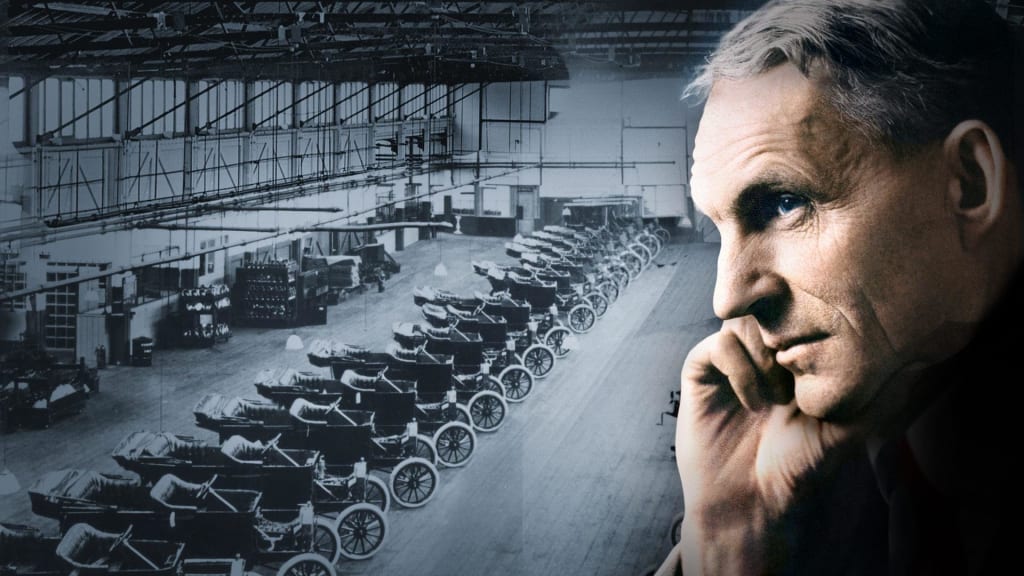10 Biographies About Henry Ford Worth Reading
These are the best 10 biographies about Henry Ford, automotive pioneer.

Though we often take our modern world for granted, much of the technology that is a part of our everyday life has not been around for very long in the scope of human history. Though we have a rich transportation infrastructure of interstate highways and other roads, there was a time when roads were rough, narrow trails and the fastest way to cross the country was by rail. Thanks to the innovation of the automobile, the government and others had a reason to build suitable routes of travel throughout the country.
With the rise of the American automobile in the early twentieth century, few people had as much impact as Henry Ford. The first widely successful auto manufacturer in the United States, Ford innovated many of the now standard aspects of the manufacturing process and the means to build an affordable car. With such a pivotal impact on modern civilization, there have been a number of excellent biographies about Henry Ford over the years.
If you're not sure that you want to read an entire biography, start with 10 facts you didn't know about Henry Ford, and find out just how interested this industry captain was. Now, let's get into the best biographies written about him.
One of the great and more honest works on Henry Ford, this book chronicles Henry Ford's improbable rise from the family farm in rural Michigan to the becoming the pioneer of the American motor car industry. He ultimately started the transformation of American life. The book notes Ford's rise from obscurity made for a bit of a "people's tycoon," coloring himself as more folksy and accessible. The book explains in-depth everything that happened when the company of Ford was born.
Though many have come to focus on the manufacturing innovations and worker reforms Ford was known for, this book is unafraid to show how many of the contradictory ideals and practices that would today be viewed as highly problematic. From his antisemitism to his strangely progressive hiring of African Americans, Henry Ford was a complex figure who is hard to label as all good or all bad.
Another of the great in-depth studies of Henry Ford and his lasting impact on modernity, Vincent Curcio's Henry Ford attempts to judge Ford overall by weighing all the actions in his life and all the contradictions of his beliefs. Curcio notes how Ford abhorred unions and labor organization and often spied on his workers to control their behavior, though he may well have created the modern middle class with the affordable wages he paid many of his workers.
In addition, Curcio goes into detailed coverage of a number of lesser-known Ford scandals and controversies that support the complicated legacy of the man. The book also notes how later in life Ford (despite his engineering of the modern world), had an affinity for the simpler pre-automotive times he grew up in, one of his greatest ironies of all.
A more recent biographical account of the legendary automotive tycoon, Richard Snow's I Invented the Modern Age: The Rise of Henry Ford, follows the early history of Henry Ford's life, his early work with the Edison Illuminating Light Company, General Motors, the failed Detroit Automobile Company and the rise and success of the Ford Motor Company.
The book also documents the development of the revolutionary Model T, the first affordable and accessible American consumer motor car. The first model of the history-making vehicle was finished in October 1908. Ford was well aware of his role in the transformation of the modern world. This book notes the full scope of Ford's impact, with the wide variety of offered products they introduced or perfected, their involvement in World War II (which may have been more complicated than most people know) and much more.
Though recent history has done a pretty good job of blowing the cover off of Henry Ford's antisemitic beliefs and statements, few people realize the full scope of his bigotry and the full impact of his hate speech on humanity. If you have heard of Henry Ford's vocal antisemitism, it was likely in reference to the antisemitic headline and article that he released in his newspaper The Dearborn Independent.
Though most people know that Ford was forced to shut the paper down due to the overwhelming public backlash, few realize that the event actually triggered a long and arduous legal battle that would help set precedent for hate speech cases forever after. In Henry Ford's War on Jews and The Legal Battle Against Hate Speech, author Victoria Saker Woeste provides an in-depth history of one of the most important and least known hate speech cases in American history and how it shaped the way we deal with hate-mongering today.
There were more skeletons in Ford's closet beyond just listing the worst Ford vehicles ever made. Having professed strong and vocal antisemitic views in his newspaper the Dearborn Independent, it comes as little surprise that Henry Ford is often linked to the Nazis and to other noted antisemitic Americans like Charles Lindbergh. While it is a staple of pop history that Hitler was inspired in many ways by Henry Ford, few people realize that Ford may have been more than just a muse to the Fuhrer.
In The American Axis, Max Wallace shows how more recently declassified information shows that Ford not only pacified the use of slaves in their German plants, but also contracted to and profited from creating war equipment for the enemies. This book shows how the pioneer of the car and perceived manufacturing hero of WWII and the first man to fly across the Atlantic Ocean were far less heroic and far more ambiguous than previously known.
Though Henry Ford is a very closely studied and appreciated, if controversial figure in American and World history, most people have no idea that he came very close to holding an elected office. With the financial success and prosperity of the growing Ford Motor Company, Ford's name was floated as a potential contender for the Michigan seat in the 1918 U.S. Senate elections.
Occurring before most of the controversies and bad PR moves Ford was known for, the creator of the horseless carriage was still relatively popular among the public. Though he ultimately lost the election, Ford came very close to victory in a wildly narrow margin and left an impact on political campaigning from then on. In his book Henry Ford vs. Truman H. Newberry: The Famous Senate Election Contest, author and historian Spencer Ervin covers the little known senate race in depth, offering insight into one of the many surprising asides and projects of Henry Ford's life.
When discussing biographies, it's also important to highlight Ford's autobiography. While the most accurate life accounts of Henry Ford and his rise to power are probably the most accurately told and well informed, it is still fascinating to see Henry Ford's own take on his life and legacy compared to what evidence has shown to be the truth.
Ford must be acknowledged for his many technical innovations and contributions to his labor force (despite being staunchly anti-union). Though the narrative is obviously heavily biased in favor of Ford's own perspective, it is valuable to know how Ford thought of himself and what he was willing to discuss. It's interesting to learn his side of the story on many things that happened in his life.
While the first name that comes to mind when thinking of the Ford Motor Company and its rise and success, it is no question that the first name to enter one's head is Henry Ford. Founding the company and laying much of the groundwork for the company's corporate takeoff, Ford owed its existence and much of its success to Henry.
Though it was Henry who brought everyone the Model T and showed everyone that an affordable car could be made, history would credit much of the later work and accomplishments during his life to his eldest son Edsel. Though his father favored his young mentor to inherit the company rather than his own son, Edsel was the one who would use his shrewdness and savvy to keep Ford afloat. Though tragically outlived four years by his father, Edsel Ford left his indelible mark on both his father and the company.
Having contributed so much to the development of the modern industrial world, Henry Ford launched himself to an elite level of society, occupied only by other innovators and captains of American industry and enterprise. With his new found wealth and connections from his time as chief engineer for Thomas Edison's Edison Illuminating Company, Ford became close friends with a circle of influential American industrialists and popular figures.
Among his gaggle of American nobility, Ford counted the friendships of inventor Thomas Edison, tire magnate Harvey Firestone, and even famed trans-Atlantic aviator Charles Lindbergh. Though his connections to Lindbergh may have been more insidious, Ford enjoyed much great leisure and adventure with Edison and Firestone, even launching a publicity driven cross-country car trip with the two to advertise and showcase the strength of his cars in a time before modern roads. Back then, the idea of there being top Ford muscle cars would have been a fever dream.
This book offers a unique look into the lives of a group of American industrial giants and their often extravagant behavior.
Though Henry Ford is well known for his role in the development of the automotive industry with the Model T, the use of the assembly line, and the livable work wage, there are many scarcely covered chapters and events in Henry Ford's life that are worth just as much attention. One such example is the two attempts Ford made at establishing a rubber plantation in the depths of the Amazon. Dubbed Fordlandia, the first of these remote company towns was impractically comprised mostly of heavily insulated, tin-roofed prefabricated buildings shipped from Michigan and proved to be an abject failure in a short time.
Trying to impose Western culture and nine to five shift work on the local workers, Ford neglected to address important concerns like the oppressive afternoon sun of the jungle, which made dawn and dusk the ideal times for work.
In Fordlandia, Greg Grandin shows how Ford's lack of understanding for the cultural and practical concerns for his rubber workers as well as the introduction of synthetic rubber brought about Ford's biggest financial and logistical blunder.
Despite many good accomplishments, failures such as this one were not forgotten, even after Ford died in 1943 in Dearborn, Michigan. Much can be learned from the biographies about Henry Ford, for like most people, he had both virtues and flaws.
About the Creator
Fred Eugene Park
Fred Park is a writer, singer and guitarist with a deep passion for music, sports and history. Fred graduated from Purchase College in 2016 with a BA in history.






Comments
There are no comments for this story
Be the first to respond and start the conversation.